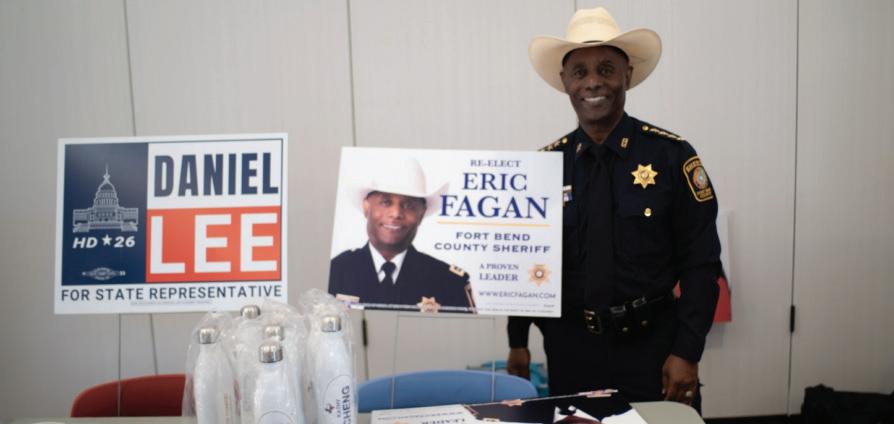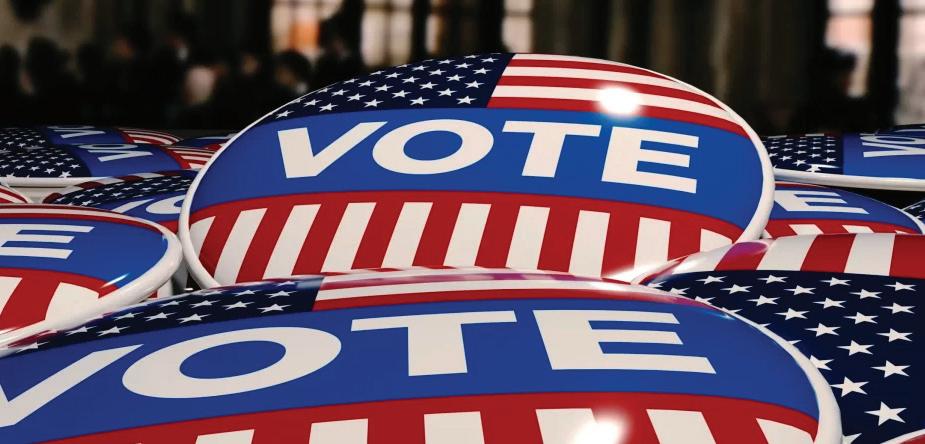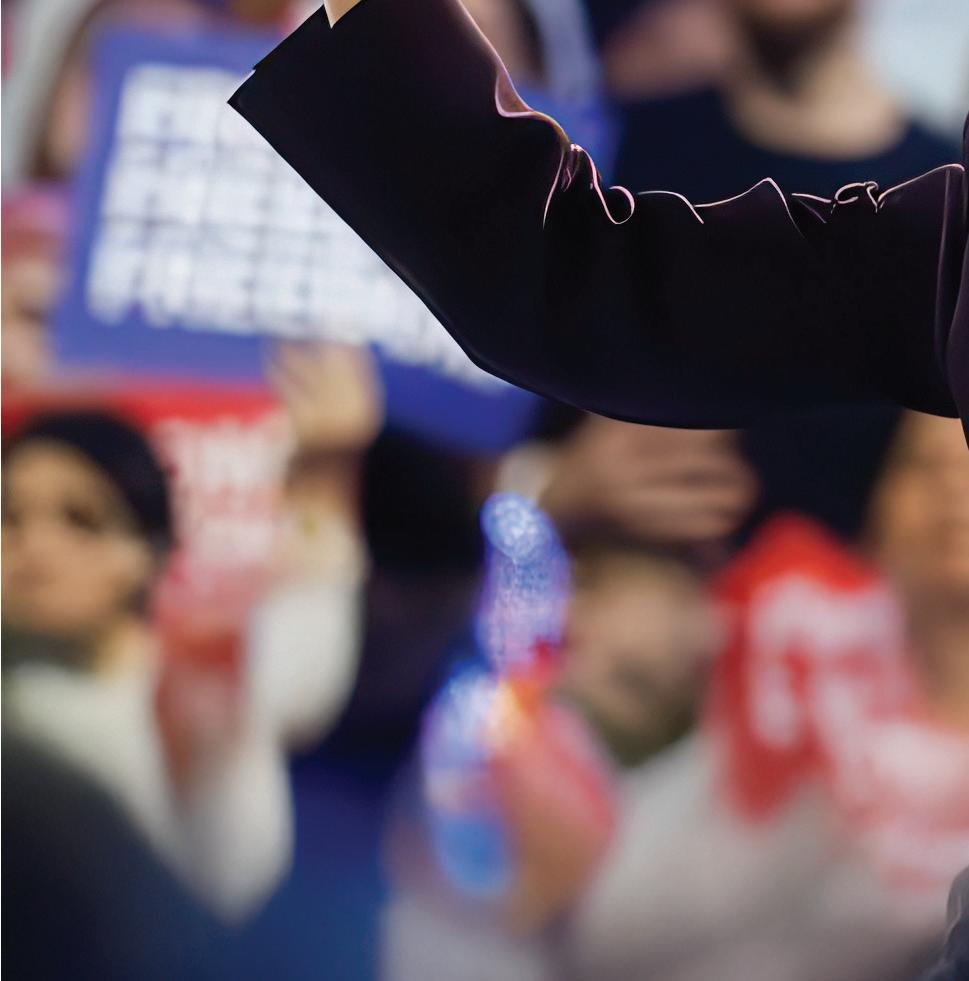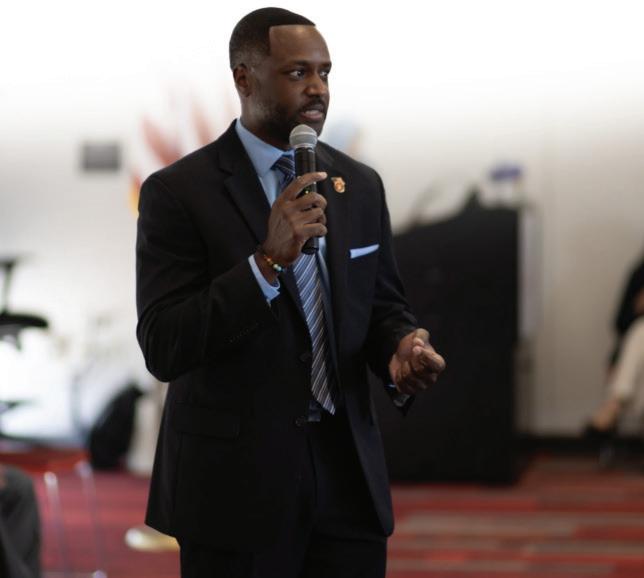





























Houston Association of Black Journalists
CEO/Publisher
Nakia Cooper
Marketing Manager
Dana Patterson
Distribution Managers
Aaron Cooper, Vonte Cooper
Senior Writer
N.C. Greene
Contributing Writer
Natalie Greene
Columnist
Ikeoma Divine
Social Media
Alexandria Green - Jones
Graphics
Nathaniel Greene
Photography
Damanion Cooper-Lee
Live Correspondent
Ciara Ross
@Iamciaraross
Email:
info@bayoubeatnews.com
Advertisement:
info@bayoubeatnews.com
Subject line: ADS
Dear Readers,
The time to make your voice heard is now! Early voting is already underway in Texas, and this election will shape crucial issues like reproductive rights, community policing, gun safety, and education funding. Your vote will help determine the direction of our state, so let’s make it count!

Valid Photo ID: Bring an accepted form of identification, like a Texas Driver's License or U.S. Passport.


Voter Registration Card: Helpful but not required if you have a valid ID.
Sample Ballot: Review your choices in advance. The League of Women Voters Houston (ww.lwvhouston.org) has a wealth of resources available to familiarize you with what’s on the ballot.

Comfortable Clothing: Be prepared for potentially long lines.

Water and Snacks: Stay hydrated and nourished.

1. Stay Calm: Assert your right to vote politely but firmly.
2. Ask for a Provisional Ballot: If your name isn’t on the list, request a provisional ballot.
3. Report Issues: Call the Election Protection Hotline at 866-OUR-VOTE (866-687-8683) for immediate help.
4. Document the Incident: Record details or take photos if possible.
As a reminder, Texans can check their voter registration status online at the Texas Secretary of State's website. To verify your registration status in Texas, visit VoteTexas.gov. For more information on your voting rights and resources, visit CanIVote.org.
With love,

Nakia Cooper Publisher, Bayou Beat News President, Houston Association of Black Journalists

Vice President Kamala Harris gathered approximately 30,000 supporters at the Kamala Harris Houston Rally on October 25, 2024, held at Shell Energy Stadium. The event emphasized reproductive rights, with attendees flashing red, white, and blue bracelets, creating an electric atmosphere.
The rally began with Willie Nelson, whose performance of Don’t Let Your Babies Grow Up to be Cowboys and On the Road Again instantly lifted the crowd’s spirits and set a lively tone for the night.
Next, actress Jessica Alba took

the stage, stressing the importance of supporting policies such as the child tax credit and small business growth, both of which Harris champions. Alba passionately stated, “We need a leader like Kamala Harris who prior- itizes reproductive freedom.”

Then, Dr. Todd Ivey, a Texas obstetrician, addressed the crowd alongside more than two dozen colleagues. He shared the difficulties faced by healthcare providers due to restrictive laws, adding, “These bans drive doctors out of the state.” He urged voters to support leaders committed to women’s health.
Ondrea, a Texas woman featured in a recent campaign ad, was next to speak. She bravely shared her experience under Texas’s abortion ban, recounting how a non-viable pregnancy nearly cost her life. “Texas abortion bans, unleashed by Donald Trump, almost cost me my life,” she said, drawing a mix of tears and applause from


“My time in Congress has been about serving all Texans,” he said. “We believe in freedom and reproductive rights.”
He added, “In 10 days, we are going to beat Ted Cruz and restore Roe v. Wade as the law of the land.” Allred urged attendees to vote, underscoring that reproductive rights are at stake in this election.
Kelly Rowland inspired the audience, encouraging them to “grab back the pen” and continue shaping history. Then, Beyoncé addressed the crowd, emphasizing her role not as a celebrity, but as a mother. “Imagine our daughters growing up without limitations,” she urged. “This is our moment to sing a new song for Ameri-
By: Natalie Greene
productive rights fight. She stated clearly, “You are ground zero in this battle.”
Harris emphasized the importance of bipartisan support, saying, “One does not need to abandon their faith to support reproductive freedom.”
Harris also warned of broader implications, pointing to potential threats to contraception and IVF access. “No one is protected if a Trump national abortion ban takes place,” she asserted. As the rally reached its climax, Harris urged Gen Z voters to take action and shape the future through voting.

yoncé’s Freedom the crowd.

Congressman Colin Allred took the stage soon after, with the crowd chanting, “Beat Ted Cruz!” Allred emphasized his commitment to representing Texas values, contrasting himself with Cruz.


ca.” to Action
Kamala Harris Delivers a Call



Harris took the stage to Be, focusing on Texas’s critical role in the re-




Harris vowed to codify Roe v. Wade and underscored the need for voter mobilization. “Reproductive freedom is on the ballot,” she declared. The crowd, filled with renewed determination, sang along to “Freedom” while raising phones and signs high in solidarity.



By: Nathaniel Greene Jr.
On Oct. 12, Fort Bend law enforcement concerns, such as human trafficking, mental health, and community trust, took center stage at the candidates forum held at the University of Houston in Sugar Land. The event was hosted by a coalition of community organizations, including Emgage, BakerRipley, and Houston Ethnic Media. Voters had the opportunity to meet candidates, ask questions, and hear their plans for the future.
Although the forum featured a wide variety of candidates—from judicial hopefuls to legislative contenders— it was the law enforcement candidates who drew the most attention. The audience, deeply concerned about public safety and justice, asked direct questions on issues like human trafficking, racial disparities in policing, and officer mental health. Fort Bend County’s sheriff candidates
and constables responded to these growing concerns about crime and community trust.
Human trafficking and public safety
One of the most pointed questions came from an audience member who asked how law enforcement addresses labor-related human trafficking. This issue, often overshadowed by sex trafficking discussions, has become a growing problem
in Fort Bend County’s booming construction industry.
Sheriff Eric Fagan, the incumbent running for re-election, highlighted his department’s collaborations with federal agencies like Homeland Security and Immigration and Customs Enforcement (ICE). He emphasized the importance of educating the community to help combat labor trafficking.
“We’ve arrested over 100 human traffickers and rescued more than 30 victims here in Fort Bend County,” Fagan said. “It’s about education. Community members often
see these situations first, and by raising awareness, we can intervene earlier and save lives.”
focus on petty crime in suburban areas like Aliana and Sugar Land. Slot criticized the current administration for being understaffed and suggested increasing collaboration between local and federal agencies to improve safety.
“We need more deputies on the streets,” Slot said. “Right now, nine deputies cover all 875 square miles of Fort Bend County. That’s not enough. We need more visibility to make residents feel safe.”
Traffic stops and community trust
Marshall Slot, Fagan’s challenger, who has over 30 years of law enforcement experience, also addressed public safety, with a was the audience.
Another critical question was how law enforcement handles traffic stops, particularly with young people and minorities. Traffic stops often escalate into dangerous situations, which concerned many in





Fagan explained his “Pizza with a Cop” program, which aims to build trust between law enforcement and young people. He also referenced House Bill 30, which mandates training for both officers and students on how to handle traffic stops.
“One of the most heartbreaking things I’ve heard came from a student,” Fagan said. “He told me he would run if pulled over by the police because he feared for his life. We have to change that perception. We’re working hard to ensure both officers and young people know how to de-escalate these situations.”
Fort Bend law enforcement concerns: Mental health support for officers
Mental health challenges, affecting both citizens and law enforcement officers, were also a key focus of the forum. Both Fagan and Slot emphasized the need for more mental health resources, especially given the heavy toll the job takes on deputies.
“Our deputies are overworked,” Slot said. “They’re working excessive overtime, which impacts their ability to serve effectively. It’s my priority to take care of their mental health so they can take care of the community.”
Fagan echoed this concern. He described his efforts to expand the department’s Crisis Intervention Team (CIT) to operate 24 hours a day.
“Mental health doesn’t stop at
5 p.m.,” Fagan said. “Our CIT team is trained to handle crises around the clock. It’s making a real difference in how we respond to those in need.”
Constable Nabil Shike and Patrick Quincy also addressed the audience, emphasizing the importance of transparency and accountability in law enforcement.
Shike, representing Precinct 3, described the role community involvement plays in his department. He outlined the steps his office has taken to ensure residents have a say in law enforcement practices.
“We created a civilian review board to provide oversight and ensure accountability,” Shike said. “Our uniforms and patrol cars were designed by the community to reflect the people we serve.”
Shike also highlighted his commitment to diversity and inclusion in leadership roles within his department.
Quincy shared his background in public service. His experience as a Marine and his current role as a chief investigator at the Fort Bend County Attorney’s Office have shaped his commitment to transparency and fairness in law enforcement.
“Leadership starts at the top,” Quincy said. “If it’s important to the leader of the agency, it will be important to the deputies on the streets.”
“One of my first actions was to appoint the first African American chief deputy and the first female captain in our department’s history,” he said. “Representation matters. Our leadership should reflect the community we serve.”
Patrick Quincy, running for Precinct 4 Constable, also stressed the importance of accountability and building trust with the public.
“We need to put the service back into public service,” Quincy said. “It’s about listening to the community and ensuring officers are held accountable.”






By: N.L. Cooper
A federal judge has struck down a provision of Texas’ restrictive voter suppression legislation, S.B. 1, ruling it unconstitutional. The ruling prohibits Texas from investigating voter assistance efforts as criminal behavior.
Voting rights advocates are hailing the ruling as a victory, even as legal challenges to other provisions of the law continue to be heard.
“The judge’s order issued a permanent injunction, meaning that no investigations or prosecutions under this provision can go forward effective immediately,” explained Leah Tulin, senior counsel in the Brennan Center’s Democracy Program.
In his 78-page decision, US District Judge Xavier Rodriguez
called the provision vague and overly broad, saying it violated freedom of speech and the 14th Amendment, which protects the rights of US citizens.
Under S.B. 1, signed into law by Texas Gov. Greg Abbot in 2021, anyone who assists voters with mail-in ballots in exchange for compensation could face both jail time and fines of up to $10,000.
In LUPE v. Texas, lawyers with the Brennan Center argued the provision’s vague language, leaving undefined terms including “vote harvesting” and “compensation,” sowed confusion among organizers uncertain over whether their actions may or may not violate the law.
In a statement, Texas Attorney General Ken Paxton has vowed to block the ruling, saying his

office would continue to investigate cases involving election violations.
Among its impacts, S.B. 1 made it harder for voters with limited English proficiency and disabilities to receive assistance, while criminalizing nonpartisan voter turnout efforts. The law also limited poll workers’ authority over partisan poll watchers, banned pro-voter innovations like drive-thru and 24-hour voting, and created new felony penalties for election officials who provided mail ballot applications to voters who hadn’t requested them. In response, the Brennan Center for Justice, along with MAL-



DEF and other organizations, filed a federal lawsuit challenging S.B. 1 in court. The plaintiffs argued that S.B. 1 violated several federal laws, including the Voting Rights Act (VRA), the Americans with Disabilities Act (ADA), and the First and Fourteenth Amendments.
According to Tulin, LUPE v. Texas is part of a broader set of consolidated cases challenging the restrictive provisions of Texas S.B. 1, which passed in the wake of the 2020 election.
“As many people say, everything is bigger in Texas and the Texas law has a ton of restrictive provisions,” she said. One of the most damaging aspects of the law was its effect on vulnerable communities, including those who rely heavily on voting support services.



“The bill created criminal penalties that have had a significant chilling effect on voter turnout and voter assistance in communities that are most in need of, and are entitled under federal law to,” she explained, adding such activities are “the very voter assistance that SB1 really took aim at.”
One major issue with S.B. 1 is its overly broad definition of “vote harvesting.” Traditionally, the term refers to illegal ballot collection, often involving fraud. However, S.B. 1 expanded the definition to include a wide range of activities, such as canvassing, advocating for a candidate or cause while in the presence of a mail-in ballot, and receiving any form of compensation.
For example, door-to-door canvassing to encourage voter participation could potentially have been criminalized under S.B. 1’s provisions. Even
reimbursing volunteers for gas might have been considered “compensation,” creating fear among nonprofit groups about how to safely engage in voter outreach.
Opponents of the law contend that uncertainty deeply impacted marginalized communities that rely on nonprofit and faith-based groups with things like voter assistance and mail-in ballots. Numerous organizations, particularly in South Texas, chose to halt voter outreach activities altogether following S.B. 1’s passage.
“Lots of organizations just said, ‘We don’t know how to keep our employees and volunteers safe from prosecution, so we’re just not going to do this at all,’” Tulin explained.
The Significance of the Court’s Decision
The court’s ruling is a significant win for minority communities in Texas, particularly with the 2024 elections approaching, noted Tulin. It also provides a sense of relief for
community groups looking to reengage in voter turnout efforts.
But Tulin says the Attorney General’s motion to halt the ruling could delay its enforcement until after the election.
“The question is going to be what happens in this emergency appellate process,” she noted.
Provisions Still Being Challenged
While Saturday’s ruling is a significant step forward, it only addresses one part of S.B. 1. Other aspects of the law remain under legal challenge. These include:
• ID matching provisions for mail ballots, requiring voters to provide ID information that matches what is in the voter registration system.
• Restrictions on poll workers’ authority to manage disruptive poll watchers.
• Criminal penalties for voter assistance, such as requiring assistors to take an oath under penalty of perjury.
• Prohibitions on drive-thru and 24-hour voting, implemented in response to Harris County’s efforts to expand voting access.
As voters prepare for the 2024 elections, Tulin stressed the importance of staying informed and engaged. For those feeling uncertain or discouraged by restrictive voting laws, she reminded them that many resources are available. Local organizations are working hard to provide accurate information and support, ensuring that voters have everything they need to fully participate.
But above all, she reminded voters of their critical role: “Democracy is not a passive enterprise. Democracy requires that people step up and have their voices heard. That’s the promise of it, and it’s also the responsibility of folks.”

